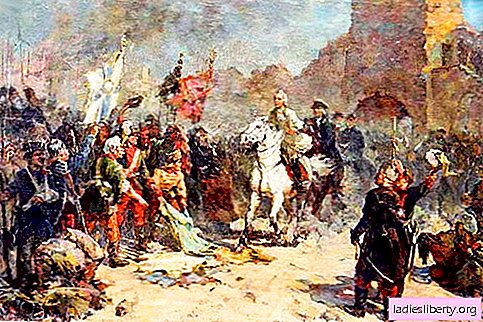
The ancient Romans believed that the nickname partly determines the fate of the dog and its relationship with the owner. And partly they were right. The quality of the name of the dog affects the upbringing of the pet, a bad name can endanger it. In a word, finding the best and correct "word" for an animal, as well as accustoming to a nickname - all these are serious tasks, for the solution of which some knowledge and advice will not be superfluous.
It is useful to start with the fact that most dogs are extremely difficult to perceive a nickname change (the chances of success of the event increase, if the owner also changes in parallel).
Plus, puppies are generally easier to learn names than animals older than 6-8 months.
Breed dogs are nicknamed according to a number of rules. For example, in one litter, all puppies receive names in one letter, in accordance with what kind of birth their mother has.
Further, the name is complicated by the prefix - the name of the nursery (for registration with cynological organizations). There are other subtleties, but they are important only when issuing a veterinary passport, recording a dog for an exhibition ... The home name may be like an “official” name or cardinally different - this is already a matter of the owner’s taste.
And it is important to heed the recommendations of experienced dog breeders that good nickname:
- consists of one to three syllables;
- starts with a vowel;
- ideally - contains the letter "P";
- equally clearly and expressively sounds at least in a whisper, at least a scream.
To avoid confusion, the nickname should not be in tune with the words of everyday speech.
Summing up, we can say that the nickname should be an unambiguous, clear signal, attracting all the attention of the animal to the owner and the will expressed by him.
Sometimes a nickname for a dog is chosen just like that, for the beauty of the sound, but more often the owners base their choice on something. And theoretically, from the variety of canine names available to humanity, the following most popular categories can be distinguished.
For example, depending on:
- Color - Dark, Knight, Silver, Night, Blue, Blackberry, Coconut, Amber, Ruby, Brownie, Zorro, Domino, Blondie, Coffee, Amethyst, Frost, Merigold, Butterscotch, Umka.
- Character and behavior - Yula, Faithful, Thunder, Excitement.
There are even special interpretations of dog names, according to which, the nickname in the future can affect the life of the animal. And here are examples of this:
- Baron - a proud, freedom-loving animal. A puppy born in winter is also difficult to train. Health is good, but there is a risk of vitamin deficiency. He does not like heat, but tolerates frosty winter well. So can be called a Rottweiler, a French bulldog.
- Gaston - distinguished by a wonderful scent, distrustful of strangers. Likes to keep company of the owner, without distracting. A puppy can be disturbed by curiosity and stubbornness. The nickname is suitable for the shepherd, collie.
- Albina - very calm and balanced. A puppy born in the summer is fastidious in food. Equally adores all family members. The nickname is suitable for a Giant Schnauzer, a pug.
There are also categories from which nicknames for hunting breeds are most often chosen - Taiga, Arrow, Cedar, Blizzard, Caesar, Knight, Viking, Attilla, Cyrus, Ramses, Gloria.
Funny and exquisitely beautiful (aristocratic) nicknames are usually suitable for decorative breeds of dogs, small pets (for example, falen, Yorkshire terrier, poodle, dachshund) - Bumblebee, Bun, Fifi, Candy, Chizhik, Pearl, Marquis, Barbie, Belle, Eclair, Lyra, Pistachio, Kiwi, Peppy, Misty, Jam.
A wide selection can be found in the names of the heroes of legends and myths, literature - Perseus, Loki, Bond, Assol, Ophelia, Bagheera, Balto, Gerda, Selena, Cleo, Ares.
And here it is necessary to emphasize that it is unacceptable for dogs of fighting, guard and hunting breeds to give nicknames that emphasize their "predatory" qualities, or remind them of their evil legendary fame (strictly speaking, in most cases, without any reason). For example, you should not call staff, kurtshaar or Doberman - Killer, Fierce, Lecturer (as a character in a book). First off, it's just unethical. Secondly, it can justifiably cause a negative reaction of others with whom the dog has to voluntarily or involuntarily contact.
There are other areas of unwanted clicks. For example, don’t give a pet derogatory nicknames - Dunce, Kozyavka, Bald (even if it's Chinese crested).
And it’s just bad form to choose a dog from one of the names common to people in the place of residence of its owner.
Indeed, if the dog’s name is Alyosha, with an acquaintance Alexei (who came to visit, met on the street), awkwardness may arise in communication.
Although the last rule is often violated by dog owners and, in principle, in society they are more or less used to it. But usually they still choose among the names of countries that are not places of residence.
It is worth doing this from the first day of the pet in the new master's house. On average, getting used to the name takes from two days to a couple of weeks. And it must be noted right away that in this matter it is required to show no less patience and courtesy, accuracy and tenderness, than at the very beginning of pet training.
In the first week, all family members are supposed to contact the puppy only by name, without replacing or mixing it with diminutive words (baby, baby, oh you are a cutie and the like).
Of course, soon the pet will learn to highlight its nickname in the stream of other words, but at first, really, do not confuse it.
And for the first time, everything rests on promotion. Several times a day, the puppy should be called to his place, offering to treat yourself tasty.
Then he will come up when he is hailed, just for affection, for the invitation to the game. Of course, you also need to use the nickname when the time comes for feeding.
Somewhere in a week, the nickname can be combined with the basic commands of the initial training course "lie", "sit", "to me."











